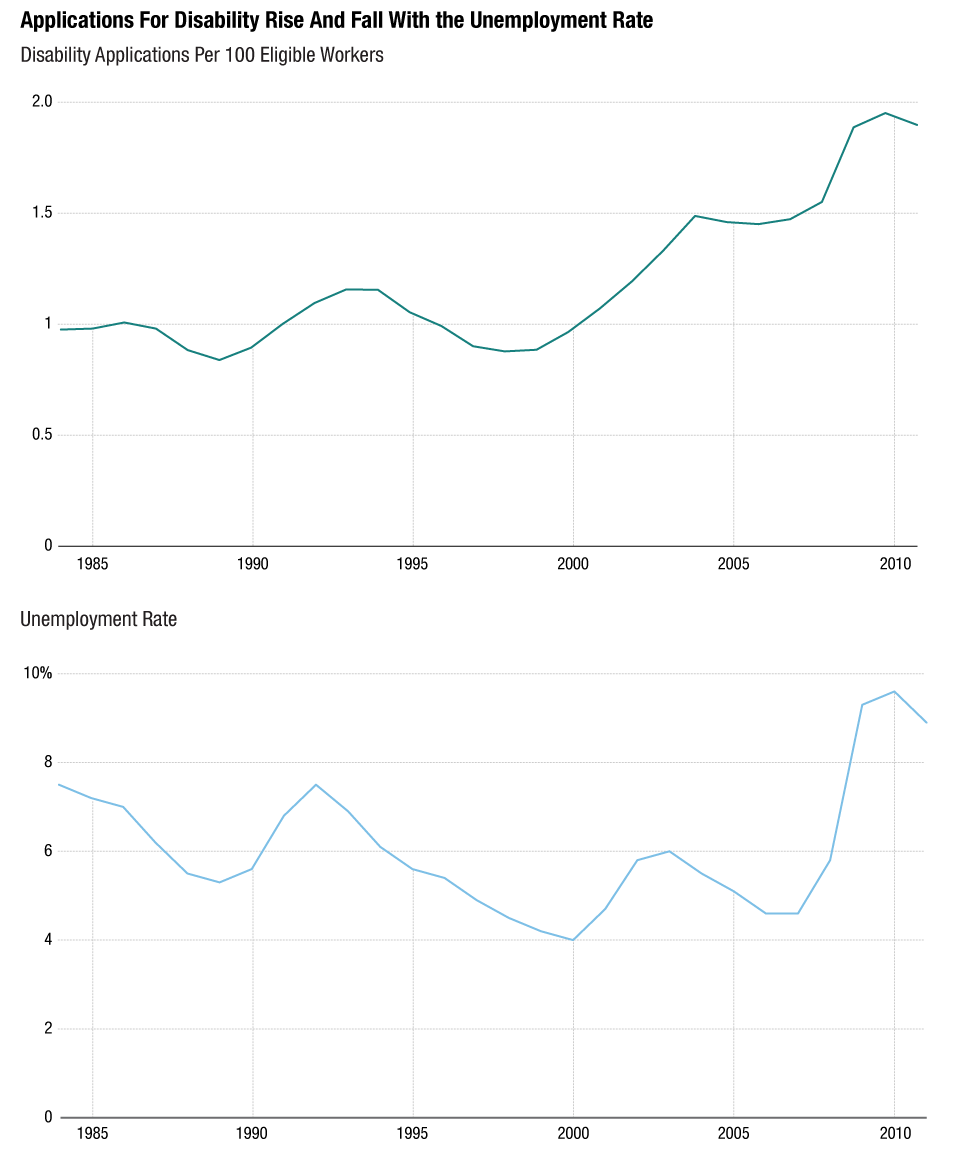But as a labor lawyer, there was another point in the piece that I found particulary fascinating. First, look at these charts, that show how applications for disability rise and fall with the unemployment rate:

Joffe-Walt argues, "disability has also become a de facto welfare program for people without a lot of education or job skills," and quotes an MIT economist who observes that unemployment statistics do not count people on disability: "'That's a kind of ugly secret of the American labor market,' David Autor, an economist at MIT, told me. 'Part of the reason our unemployment rates have been low, until recently, is that a lot of people who would have trouble finding jobs are on a different program.'" On a more anecdotal level, Joffe-Walt talks about a woman with back pain who, it seems, "could not conceive of a job that would accommodate her pain." In the radio version (short version and long version) she observes that this reflects a gap between her own world and the world of low-skilled workers: for Joffe-Walt, and myself, and our coworkers, we are able to work successfully with back problems and knee problems and other physical ailments. For low-skilled workers, it seems, there may be a mismatch between their job skills and physical abilities (and limitations), on the one hand, and the jobs that are available to them on the other.
With this fresh in mind, a remark in this Daily Beast article grabbed my attention. In the provocatively-headlined, "Why a BA is Now a Ticket to a Job in a Coffee Shop", Megan McArdle reviews some recent social science studies suggesting that more and more college graduates are winding up with low-skilled service-sector jobs. She considers the policy implications of this trend, asking if too many young people are spending too much money on college. And in the course of this analysis, she observes that as college grads increasingly fill low-wage service jobs, "The workers who can't get those jobs are taking less skilled ones. The lowest-skilled workers are dropping out entirely, many of them probably ending up on disability." This remark certainly seems bourne out by the data in Joffe-Walt's study.
How can we find a better solution than the sort of jerry-rigged social response of putting people on disability?
[A couple caveats before I move on: of course there are many folks who so disabled that they can't perform any job. I'm not talking about them. Also, there may be some folks who scam the system because they are lazy. I'm not talking about them either.]
"Unfit for Work" makes clear that while "disability has become a de facto welfare program . . . it wasn't supposed to serve this purpose; it's not a retraining program designed to get people back onto their feet . . . federal disability programs became our extremely expensive default plan." The program also fails to serve a welfare-like social purpose because "in most cases, going on disability means you will not work, you will not get a raise, you will not get whatever meaning people get from work. Going on disability means, assuming you rely only on those disability payments, you will be poor for the rest of your life." Not only does disability fail to serve the social purpose of a welfare safety net, but it is an entirely unsustainable safety net, such as it is: "disability programs, including health care for disabled workers, cost some $260 billion a year. . . . The reserves in the disability insurance program are on track to run out in 2016."
It is clear that we need a new solution. There are a lot of depressing facts to take away from this. But I also learned a couple of things from this reporting that I find really valuable and not simply cause for despair: first, disability is a big part of the answer to the question of what happens to low-skilled (or wrongly-skilled) workers in this dismal economy, and should be borne in mind when considering unemployment statistics; and second, the study makes clear that disability programs serve as a poor stand-in for the welfare, job-retraining, and social safety-net programs we really need. Now that we see these glaring errors and omissions in our social system, let's get to work at designing better programs that present better solutions to our social and economic problems. Namely, finding jobs and health care for everyone who is able to contribute to our economy and society.
